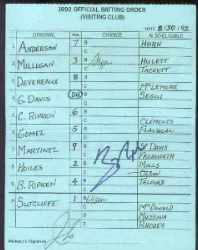1977-78 Topps Basketball #126 Bobby Smith AUTOGRAPHED (Cavaliers)
| Grade |
NM/MINT to EX/MINT |
| Book Value |
n/a |
| Our Price |
$ 9.95
Add to cart
|


Below are short bits & pieces on sportscard & baseball trading card collecting.
Please wander around the website for more info, prices, values & images
on vintage baseball, football, basketball, hockey, sport and non-sports cards.
Team Autographed/Signed Baseballs
1903-1949 WORLD SERIES
Pennant Winners and World Series Champions balls are
highly desirable and increase their value.
*** 1903-1949 WORLD SERIES results ***
1949 Yankees Dodgers 4-1
1948 Indians Braves 4-2
1947 Yankees Dodgers 4-3
1946 Cardinals Red Sox 4-3
1945 Tigers Cubs 4-3
1944 Cardinals Browns 4-2
1943 Yankees Cardinals 4-1
1942 Cardinals Yankees 4-1
1941 Yankees Dodgers 4-1
1940 Reds Tigers 4-3
1939 Yankees Reds 4-0
1938 Yankees Cubs 4-0
1937 Yankees Giants 4-1
1936 Yankees Giants 4-2
1935 Tigers Cubs 4-2
1934 Cardinals Tigers 4-3
1933 Giants Senators 4-1
1932 Yankees Cubs 4-0
1931 Cardinals Athletics 4-3
1930 Athletics Cardinals 4-2
1929 Athletics Cubs 4-1
1928 Yankees Cardinals 4-0
1927 Yankees Pirates 4-0
1926 Cardinals Yankees 4-3
1925 Pirates Senators 4-3
1924 Senators Giants 4-3
1923 Yankees Giants 4-2
1922 Giants Yankees 4-0
1921 Giants Yankees 5-3
1920 Indians Robins 5-2
1919 Reds White Sox 5-3
1918 Red Sox Cubs 4-2
1917 White Sox Giants 4-2
1916 Red Sox Robins 4-1
1915 Red Sox Phillies 4-1
1914 Braves Athletics 4-0
1913 Athletics Giants 4-1
1912 Red Sox Giants 4-3
1911 Athletics Giants 4-2
1910 Athletics Cubs 4-1
1909 Pirates Tigers 4-3
1908 Cubs Tigers 4-1
1907 Cubs Tigers 4-0
1906 White Sox Cubs 4-2
1905 Giants Athletics 4-1
1903 Americans Pirates 5-3
Click for our current
Autographed/Signed Team Baseball inventory
|


Authentic Major League SIGNED
Game-Used LINEUP Cards (PSA)

These are the official lineup cards SIGNED BY THE MANAGER & given
to the home plate umpire before the game with the team's line-up
& batting order !!! Making them even neater, often managers made
lineup changes on these cards throughout the game.
These official lineup cards were SIGNED BY THE MANAGER and presented
to the home plate umpire before the game. They detailed the team's lineup and
batting order. Managers often made lineup changes on these cards throughout
the game, making them even more unique.
Collectors say "They are official documents of a particular game, so they are
absolutely historically relevant. The manager, he was the general in the war.
Imagine owning Eisenhower's list of who he wanted to go into battle, and then he
signed it !!! Imagine what that would be worth?"
The first dugout lineup cards were seen around 1960. Along with lineup
cards, most ended up in the trash after games, making them quite rare today.
MLB saw the light and started marketing them directly in the 2000's.
Astronomical prices have been paid for cards from special games.
$165,010 for the Red Sox dugout lineup card from Game 4 of the 2004 World Series.
$138,000 in 2007 for 1st ever All-Star Game batting order cards.
$ 40,000 for batting order cards and the pen used to fill them out from
Cal Ripken's 2,130th & 2,131st games.
Click for complete
Major League SIGNED Game-Used LINEUP cards
Note: You may be on that page right now.
|

Tobacco Cards
Starting approximately in 1886, sportscards, mostly baseball cards, were often
included with tobacco products, for promotional purposes and also because the
card reinforced the packaging and protected cigarettes from damage. These sports
cards are referred to as tobacco cards in the baseball card hobby. Over the next
few years many different companies produced baseball cards. Tobacco cards soon
started to disappear as the American Tobacco Company tried to develop a monopoly
by buying out other companies.
They were reintroduced in the 1900s, as American Tobacco came under pressure from
antitrust action and Turkish competition. The most famous and most expensive,
baseball card is the rare T206 Honus Wagner. The card exists in very limited
quantities compared to others of its type because Wagner forced the card to be
removed from printing. It is widely (and incorrectly) believed that Wagner did
so because he refused to promote tobacco, but the true explanation lies in a
dispute over compensation.
Soon other companies also began producing baseball and football cards. Sports magazines
such as The Sporting News were early entries to the market. Candy manufacturers
soon joined the fray and reflected a shift toward a younger target audience for cards.
Caramel companies were particularly active and baseball cards were one of the first
prizes to be included in Cracker Jacks. World War I soon suppressed baseball card
production.





 These are the official lineup cards SIGNED BY THE MANAGER & given
to the home plate umpire before the game with the team's line-up
& batting order !!! Making them even neater, often managers made
lineup changes on these cards throughout the game.
These official lineup cards were SIGNED BY THE MANAGER and presented
to the home plate umpire before the game. They detailed the team's lineup and
batting order. Managers often made lineup changes on these cards throughout
the game, making them even more unique.
These are the official lineup cards SIGNED BY THE MANAGER & given
to the home plate umpire before the game with the team's line-up
& batting order !!! Making them even neater, often managers made
lineup changes on these cards throughout the game.
These official lineup cards were SIGNED BY THE MANAGER and presented
to the home plate umpire before the game. They detailed the team's lineup and
batting order. Managers often made lineup changes on these cards throughout
the game, making them even more unique.
